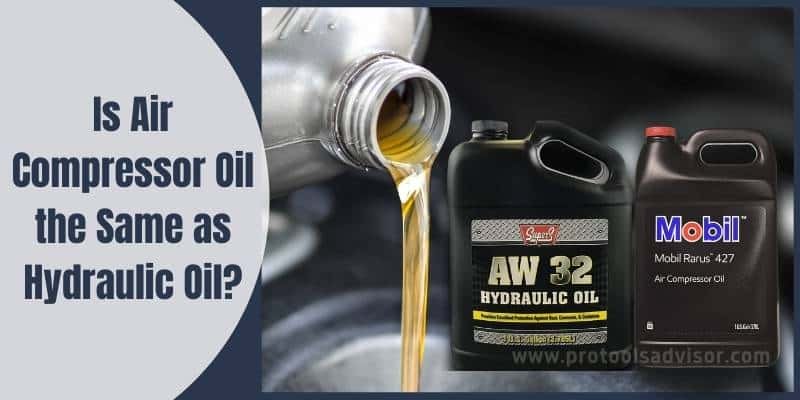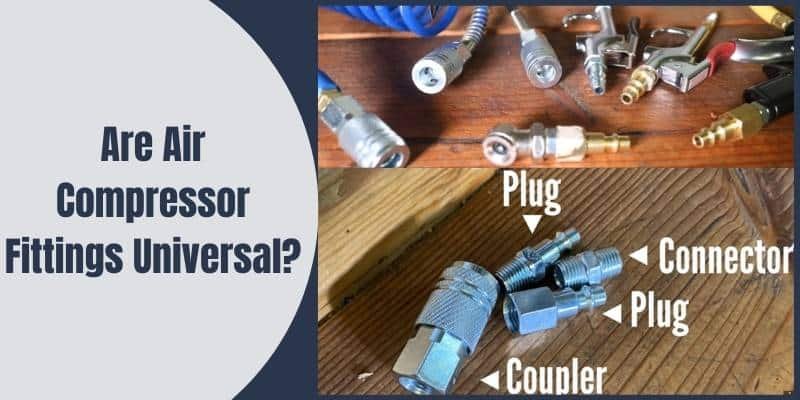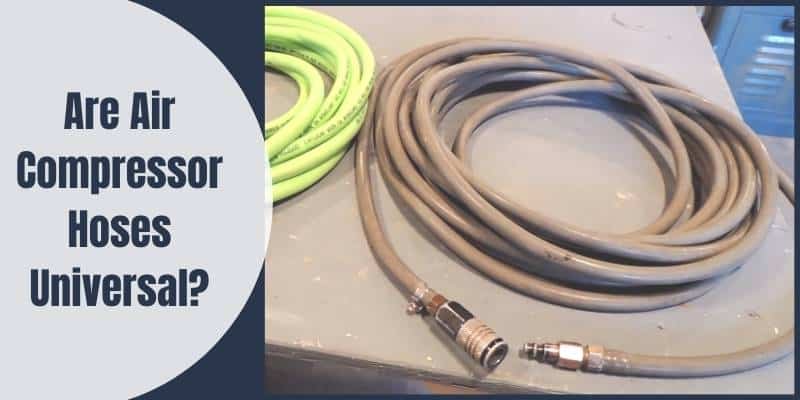Disclosure: This post contains affiliate links and I will be compensated if you make a purchase after clicking through my links. Learn More
When moving parts on machines are at high velocity, lubrication and heat dissipation are required. Lubrication is crucial for keeping a machine away from wearing off or sustaining sudden damage due to friction. Hydraulic fluid and air compressor fluid are for these purposes.
Because both of these oil types serve the same purpose it’s not uncommon to say, “Is air compressor oil the same as hydraulic oil?”
Air compressor oil and hydraulic oil match some of the major properties. Also due to low viscosity, hydraulic oils can be a substitute for air compressor oils given that the required additives are present. But, they are completely different in terms of their applications.
Continue reading and things will be much clearer to you.

Is Air Compressor Oil the Same as Hydraulic Oil?
No, air compressor oil is not the same as hydraulic oil. They differ in formulations and serve distinct purposes. Air compressor oil lubricates compressors, while hydraulic oil transmits power and lubricates hydraulic systems in machinery.
Air compressors are pneumatic tools that use compressed air to operate, whereas hydraulic machines use a hydraulic system. They don’t serve the same purpose. Similarly, the characteristics of their oils differ. The primary job of hydraulic oils is to transfer hydraulic power from one component to the other, whereas air compressor oils are used to lubricate the moving parts.
A Short Comparison About Air Compressor Oil vs Hydraulic Oil
| Factor | Air Compressor Oil | Hydraulic Oil |
|---|---|---|
| Function | Lubricates air compressors to reduce friction and wear | Transmits power and lubricates hydraulic systems to control machinery |
| Viscosity | Typically lower viscosity to flow easily in high-speed air compressors | Generally higher viscosity for better load-carrying capacity and system stability |
| Additives | Contains anti-foaming agents to prevent foam formation in high-speed compressors | Contains anti-wear, anti-corrosion, and anti-oxidation additives to protect hydraulic components |
| Compatibility | Designed to work with air compressors, valves, and seals | Formulated to be compatible with hydraulic pumps, valves, and actuators |
| Operating Temperature | Handles lower temperature ranges due to air compressor operation | Suited for higher temperature applications in hydraulic systems |
| Water Separation | Some air compressor oils have better water separation properties | Specially formulated hydraulic oils have improved water separation capabilities |
| Filtration Requirements | May require less stringent filtration compared to hydraulic systems | Hydraulic systems often require precise filtration for optimal performance |
| Compressor Oil Types | Available in mineral, synthetic, or semi-synthetic varieties | Available in different types, including mineral, synthetic, and biodegradable options |
| Hydraulic Oil Types | Available in various types, including anti-wear, fire-resistant, and environmentally friendly options | Different types such as mineral, synthetic, biodegradable, and fire-resistant hydraulic oils |
| Foam Suppression | Emphasizes foam suppression for efficient air compression | Emphasizes resistance to foaming to maintain hydraulic system functionality |
| Application | Primarily used in air compressors for industrial, automotive, and other applications | Primarily used in hydraulic systems in construction, manufacturing, and transportation industries |
| Performance Expectations | Focuses on lubrication and cooling of air compressors | Balances lubrication, power transmission, and system performance in hydraulic applications |
Air Compressor Oil Properties and Functions Details
Here are the common properties that describe air compressor oil.
Viscosity
Air compressors oil need to have low viscosity. Lower viscous oil ensures better lubrication at a high temperature as well as enables good fluidity at low temperatures. Standard viscosity for air compressor oil is 20 to 30 weights.
Anti-Foaming
Air compressor oils are mostly non-detergent. Detergents can create foams in oil which makes it harder to pump. It can severely damage the compressor engine parts as well. This is why an anti-foaming additive is important in air compressor lube.
Thermal Stability
The ability to resist decomposition due to temperature changes is called thermal stability. Air compressor oils need to be thermally stable and should not form carbon deposits.
Chemical Stability
Air compressor oils do not get into any chemical reaction with refrigerants or materials used in the compressor.
Wear Resistance
In a rotating mechanism, it is crucial to reduce the friction of the material with each other. There are additives in this oil that reduce the wear and tears on the parts. Additionally, good lubrication and heat dissipation ensure good wear resistance.
Heat Dissipation
Air compressor oil acts as a coolant, dissipating heat from the mechanical components of the compressor. Moving mechanisms have a tendency to generate heat. If the heat is not passed through a medium, the pieces will overheat and melt.
Good Lubricity
Air compressor oil features good lubricity, ensures a smooth motion of the moving parts inside the compressor mechanism.
Hydraulic Fluid Properties and Functions Details
Here are the common properties that describe hydraulic fluid.
Power Transmission
Hydraulic fluids conduct power transmission by moving oil across the system. The controlled circulation of pressurized oil secures the mechanical output.
Ideal Viscosity
The viscosity of a hydraulic system is chosen based on the impact of temperature change in oil viscosity for certain types of equipment. Viscosity is shown in specs sheet between 40° to 100° C and measured in either centistokes or mm2/sec. Depending on the application the ideal viscosity for hydraulic fluid ranges from 10 and 100 mm²/sec.
When the temperature increases, viscosity decreases. And when the temperature decreases, viscosity increases. A more viscous fluid will give a proper outcome in the warmer months and vice versa.
Anti-Foaming
Hydraulic fluid does not contain detergents. So, they can operate inside the hydraulic system with ease. Anti-foaming additives ensure chemical stability.
Chemical and Physical Stability
Hydraulics fluids need to undergo various temperature and pressure changes. So, the fluid property should be stable to ensure a good power transmission and lubrication. Hydraulics fluids are both chemically and physically stable.
Heat Dissipation
Hydraulic Oils are very good at transmitting heat from the system. As the mechanism moves inside, heat is generated. The hydraulic oil then dissipates that heat to a cooling system.
Good Lubricity
Hydraulics fluids transmit power across the system. And it also ensures lubrication inside the moving mechanism. Hydraulic oil ensures a smooth transition and rub-resistance of the mechanical parts.
Anti-Oxidant
These oils resist oxidation. So, there will be little to no formation of rust in internal machine parts.
Can I Use Hydraulic Oil in Air Compressors?
Many characteristics match for both fluids, as you can determine from the functions and properties described above. So, naturally a question comes to mind, “can I use hydraulic oil in an air compressor?” Yes, you can use hydraulic fluids as a substitute for compressor oil. But there are a few things to remember before you do that-
Read More: Can you use 10w30 oil in your air compressor?
Precautions
Try not to choose any specialized hydraulic fluid like the power steering fluid as they contain specific additives. Try to choose the generalized version labeled as ‘for use in all hydraulic systems’.
And as the air compressor requires less viscous oil, you will have to choose 10 to 30 weights of hydraulic fluid. More than this level will be much thicker for the air compressor system.
Using oils apart from OEM’s (Original Equipment Manufacturer) version will void the warranty. It may also damage the system if the additives inside hydraulic oil are not the same as the OEMs.
During Emergencies
Use hydraulic oils in your air compressor only in emergencies. Use the substitute when the oil is not available in the market. Also, if you need to start the compressor immediately after accidentally draining the oil, you can use the substitute.
Final Words: Is Air Compressor Oil and Hydraulic Fluid the Same?
Many characteristics of hydraulic and air compressor oil matches. Both hydraulic fluid and air compressor oil do not contain detergent. Apart from the two aspects, viscosity and power transmission, other properties like lubricity, chemical and thermal stability, and cooling properties also match. But that doesn’t necessarily mean they are the same. Hydraulic and pneumatic oils are used in different scenarios for a separate outcome.
In terms of viscosity, both have lower levels but hydraulic fluids come in different viscosity indexes. Certainly transmitting hydraulic energy is a more critical job than just lubricating. As a result, determining the right viscosity for hydraulic fluid in various temperature ranges is significantly more important than determining the right viscosity for air compressor oils.


